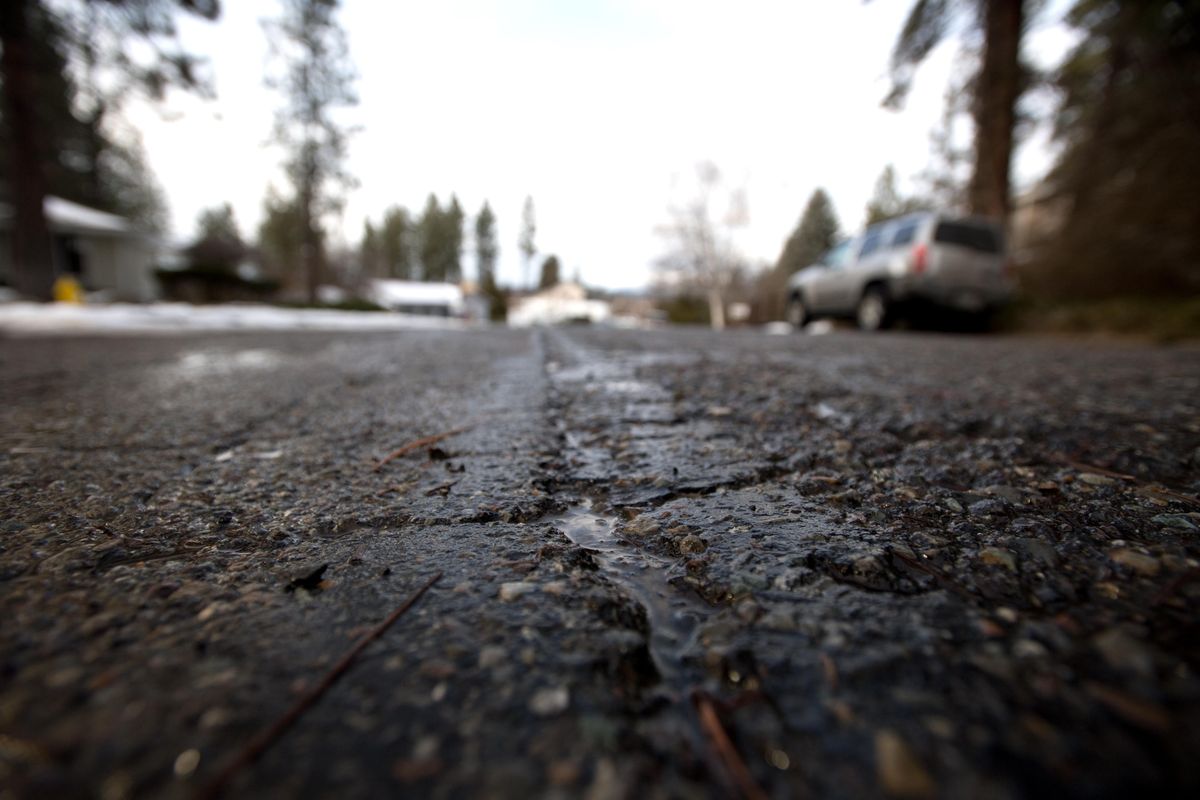Spokane Valley faces shortfalls in road maintenance budget

The decline of landlines could make a drive through Spokane Valley more bumpy.
The city has enjoyed a reputation for smooth streets. But with its funding for road preservation in decline, city officials are considering raising taxes to maintain roads – which the city hasn’t done since 2009.
The city funds road preservation through a combination of grants and city funds – including a 6 percent telephone tax imposed in 2009 to pay for street maintenance. The landline telephone tax generated $3.1 million its first year, but revenue is estimated at only $1.9 million in 2018 as more people give up landlines.
Spokane Valley Mayor Rod Higgins said prior council members thought the problem with funding street maintenance was solved with the telephone tax.
“People said, ‘We can grow our way out of this as long as sales taxes and property taxes are rising,’ ” he said. “But, what happens if they aren’t? Do we let our roads go?”
In 2004, more than 90 percent of U.S. households had a landline telephone. However, with the growing popularity of smartphones, that number dropped to 43 percent of homes, according to data by the Centers for Disease Control and Prevention, which tracks phone ownership.
City officials in 2016 had a variety of discussions to address the street maintenance deficit – including adding a vehicle tab fee or electricity tax, but chose to forgo those options.
But the city already has implemented one new fee to boost its road money.
Last month, the city created a 12.5 percent street wear fee on some trash services that will generate $1.5 million annually. Because of savings in the city’s new contract with it’s garbage collector, Waste Management, many customers may not notice an increase in their trash bills.
Higgins said the city needs to find a dependable and reliable revenue source to replace the telephone tax, but council has yet to decide on the type of tax.
“We haven’t really landed on something and we won’t until we have a good conversation with the citizens,” he said. “In the meantime, we will – at the end of this budget year – be in the hole, so we have got to address it this year.”
Spokane Valley has $5.2 million available for road preservation, but city officials say they need close to $7 million per year to maintain good condition of its roads.
Road preservation has been a topic the city has wrestled with for many years. Repair has been mainly a complaint-driven process, said Deputy City Manager John Hohman at the city’s winter workshop meeting.
“Right now, what we really have is a reactive pavement management program. We haven’t really stepped into a proactive mode yet,” Hohman said. “We’re just trying to tackle the worst right now and I think that needs to transfer to a more proactive system.”
Councilman Ben Wick said when the city incorporated in 2003, it inherited a large amount of good roads from Spokane County, which installed sewer lines and agreed to replace the roads curb-to-curb.
“We’ve had a long time where local streets didn’t need a lot of repair,” he said.
The city embarked on a partial road-preservation project for 17 segments in 2012 but continued to lose ground with sections of roads needing to be rebuilt, Woodard said.
The city is using more of its other revenue, including from real estate excise taxes, toward road preservation, which is depleting revenue for larger projects, Higgins said.
While Spokane Valley has allocated $2 million in 2018 to preserve its arterial roads, the council is considering options to address a deficit of $300,000 to $1.8 million for residential road work.
It can cost seven times as much to repair a road in poor condition than to maintain it in good condition, according to city documents.
Wick said finding money to address the shortfall may be obtainable through grants for arterial roads.
But, Woodard said, it’s not sustainable to rely on grants every year, and while he will not vote for a property tax, imposing some sort of tax may be necessary.
“There’s no place else to get the money,” he said. “At one point, the budget won’t have surpluses. Roads have to be done every year. They are not free or cheap. The more we’re able to maintain them, the less they cost.”
Woodard said the goal of council is to increase street revenue without burdening Spokane Valley residents.
“We have a real opportunity to continue to have very good roads in the foreseeable future if we do it right and do it now,” Woodard said.